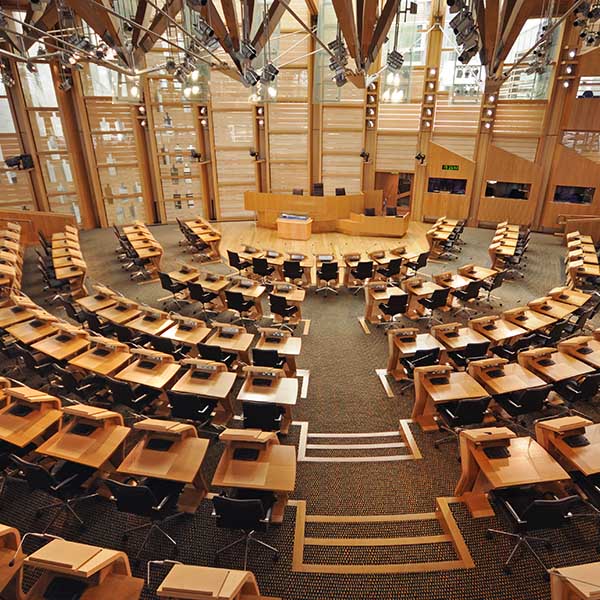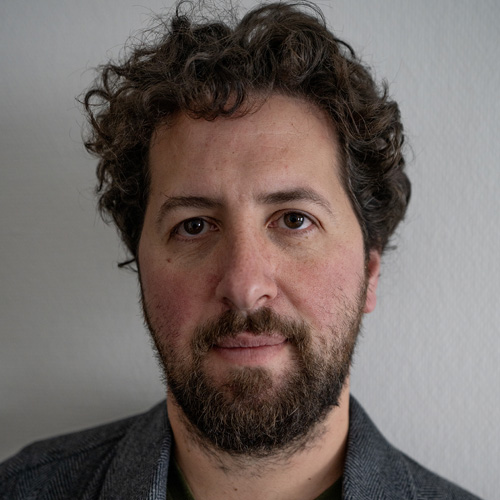MSc Public Policy
ApplyKey facts
- Start date: September
- Study mode and duration: 12 months full-time; 24 months part-time
Study with us
- explore various conceptual and methodological tools and their connections to real-world problems
- gain a range of useful research and analysis skills
- freedom in dissertation topic to focus on any area of public policy
- provides rigorous training in the analytical frameworks and methods required in the study of public policy
- ideal for those wanting professional skills to become a policy practitioner, analyst or to proceed to a PhD
The Place of Useful Learning
UK University of the Year
Daily Mail University of the Year Awards 2026
Scottish University of the Year
The Sunday Times' Good University Guide 2026
Why this course?
Our MSc in Public Policy provides rigorous training in the analytical frameworks and methods required in the study of public policy. You’ll explore the various methodological tools and their connections to real world problems facing governments and related organisations. You’ll also gain a range of key skills including:
- analytical and critical thinking
- research management
- data analysis
- report writing and presentation
The course is ideal for those wanting professional skills to become a policy practitioner, analyst or to proceed to a PhD.
Want to hear more?
Head over to YouTube to watch our video of Dr Despina Alexiadou discussing why you should study this course.


What you’ll study
The course is organised into core and optional classes. The core classes provide an introduction to the theory and practice of public policy, as well as a range of skills and methodologies to design, conduct and report on social research. In addition, you'll undertake a research project dissertation.
Work placement
You may apply to do a client-based project as part of your dissertation research. Following a career workshop session, and on the advice of the School, you can contact host organisations including local, city, and national governmental organisations to arrange a work-based MSc dissertation.
These projects will normally be unpaid and may need to be developed further to meet the requirements of an MSc dissertation.
Facilities
The School of Government & Public Policy have a number of research centres that relate to the topics covered and the content of the course. For example, the European Policies Research Centre is a leading hub for the study of regional development policy and collection of such data in Europe, a centre that is of increasing importance in the wake of Brexit.
Specialised policy centres focused on health and energy – such as the Centre for Energy Policy – also add to the applied policy environment at Strathclyde. The Institute for Future Cities' City Observatory, located in Strathclyde’s award-winning Technology & Innovation Centre, uses data to understand and address urban problems. The University also has many centres and institutes with projects that incorporate European governance and political issues, such as Fraser of Allander Institute.
Guest lectures
Speakers at our weekly seminars include guest lecturers who come to Strathclyde as part of the Erasmus programme. They're also available for individual consultations with you as an MSc student here. Strathclyde’s organised research centres such as the European Policies Research Centre, routinely host their own 'Speaker’s Series' where talks relevant to the content of the course are common. You'll have time for networking with visiting speakers afterwards.
Learning & teaching
All classes are taught in seminars, which combine theoretical discussion and a strong empirical or policy focus, as appropriate. Seminars consist of a variety of teaching techniques; including from small-group work, structured debates, presentations, and background lectures.
Classes average 20 contact hours with additional computer laboratory sessions for some methods classes.
Assessment
Methods of assessment include written assignments, blogs, podcasts, practical team projects, presentations, individual projects, and exams. Most classes involve more than one method of assessment to help you realise your potential.
Taught classes make up two-thirds of the total assessment. You will complete a dissertation over the summer, which accounts for the remaining third.
Course content
Please note that the below is an indicative list of classes. These are subject to change.
Theories and Practices of Regulation and Governance
The aim of this class is to introduce students to the concepts, theories, institutions, and processes of regulatory governance. The course is designed to provide students with analytical tools to understand the interactions between actors and institutions forming contemporary governance systems.
Policy Analysis
This class investigates theories of the policy making process. After taking this class you will be able to describe, and perhaps even influence, real-world policy making.
You'll also choose a minimum of two classes from the following:
Qualitative Methods
This class provides an overview of the ever-expanding field of qualitative methods in Political Science, International Relations and Policy Studies. A variety of data collection/generation and analytical methods will be examined, and situated within different traditions/paradigms of social research.
Throughout this class, we'll examine how these methods can be applied in students’ own research projects.
Political Behaviour
This Masters level post-graduate seminar provides an introduction to the social scientific study of mass political behaviour.
It consists of weekly seminars that focus on quantitative (largely survey based) research on various forms political behaviour and underlying attitudes, such as voting, participation, political culture, values, intolerance racism, xenophobia or socialization.
The focus will be on the questions political scientists ask, the data they collect, the research designs they use, and the implications of their results.
Quantitative Methods 1
This class introduces participants to the use of quantitative methods in social research; in particular, the logic and language of empirical analysis, the principal types of quantitative data (official statistics and surveys), and the use of software packages for statistical analysis.
Quantitative Methods 2
This class trains participants in the design, application, presentation, and critical evaluation of quantitative political research using relevant software packages for statistical analysis.
International Institutions & Regimes
The purpose of this class is to provide students with a comprehensive overview of the concepts and theoretical approaches central to understanding and analysing the role of international institutions and regimes in the contemporary world.
This class will survey a variety of international institutions and regimes, exploring how they shape global interactions in a number of cross-cutting issue areas such as security, trade, human rights and the environment. The overall analysis will contribute to the understanding of the theories, practices and processes through which global politics are organised and to an assessment of the future of international institutions and regimes in global governance.
European Governance
This class seeks to examine the EU system of governance through the lenses of democracy, legitimacy and efficiency. Examining key processes, policy areas and proposals for reform, participants will be encouraged to consider the role of the EU and the nature of its relationship with its public.
Comparative Political Economy
This class revolves around the different aims for conducting comparative policy analysis such as explaining the variation of policy output and outcome across different institutional, economic, social and cultural settings, generalising a given theory of policy process in different geographical contexts and by taking time into consideration, as well as capturing the interdependence of countries. Units of analysis include countries, states/regions, local governments, and international organisations.
Contemporary Security Challenges and Responses
Security is an overarching concern of contemporary times. The late 20th century saw radical changes to the concept of security. No longer primarily focused on war between nation-states, security threats became far more varied and a-symmetrical, with increased attention paid to counter-terrorism and cyber-security. Contemporaneously, the concept of national security expanded to incorporate not only ‘traditional’ threats from hostile actors, but a host of issues ranging from the impact of climate change, natural disasters, resource security and even recession. Security has become increasingly globalised and interconnected in threat and response while also increasingly recruiting the populace to be ‘secure citizens’.
In this class we'll analyse today's key security challenges, looking at the shifting definition of security, 'traditional security' in the 21st century, human security and humanitarian intervention, refugee and migrant security, terrorism and counter-terrorism, protective security, cyber-security and climate change and security.
Entry requirements
| Academic requirements | First-class or Second-class Honours degree, or international equivalent, in social science. |
|---|---|
| English language requirements | Please check our English requirements before making your application. |
Interested in postgraduate study?
At the Faculty of Humanities and Social Sciences, our friendly and knowledgeable team will be available to provide you with all the information you need to kick-start your postgraduate journey at the University of Strathclyde. Register for upcoming events below:
Pre-Masters preparation course
The Pre-Masters Programme is a preparation course held at the University of Strathclyde International Study Centre, for international students (non-UK/Ireland) who do not meet the academic entry requirements for a Masters degree at University of Strathclyde.
Upon successful completion, you'll be able to progress to this degree course at the University of Strathclyde.
Chat to a student ambassador
If you want to know more about what it’s like to be a Humanities & Social Sciences student at the University of Strathclyde, a selection of our current students are here to help!
Our Unibuddy ambassadors can answer all the questions you might have about courses and studying at Strathclyde, along with offering insight into their experiences of life in Glasgow and Scotland.
International students
We've a thriving international community with students coming here to study from over 140 countries across the world. Find out all you need to know about studying in Glasgow at Strathclyde and hear from students about their experiences.

Faculty of Humanities & Social Sciences Scholarships
EU Engagement Scholarships are available to EU applicants who would have previously been eligible for Home (Scottish/EU) fee status.
Fees & funding
All fees quoted are full-time per academic year unless stated otherwise.
Fees may be subject to updates to maintain accuracy. Tuition fees will be notified in your offer letter.
All fees are in £ sterling, unless otherwise stated, and may be subject to revision.
Annual revision of fees
Students on programmes of study of more than one year (or studying standalone modules) should be aware that the majority of fees will increase annually.
The University will take a range of factors into account, including, but not limited to, UK inflation, changes in delivery costs and changes in Scottish and/or UK Government funding. Changes in fees will be published on the University website in October each year for the following year of study and any annual increase will be capped at a maximum of 10% per year. This cap will apply to fees from 2026/27 onwards, which will not increase by more than 10% from the previous year for continuing students.
| Republic of Ireland |
If you are an Irish citizen and have been ordinary resident in the Republic of Ireland for the three years prior to the relevant date, and will be coming to Scotland for Educational purposes only, you will meet the criteria of England, Wales & Northern Ireland fee status. For more information and advice on tuition fee status, you can visit the UKCISA - International student advice and guidance - Scotland: fee status webpage. Find out more about the University of Strathclyde's fee assessments process. |
|---|---|
| Scotland, England, Wales & Northern Ireland | Full-time: £10,100 *Please note: Year 2 fee will be subject to an increase |
| International | £23,550 |
| Additional costs | Poster presentation: £10. Visa & immigration: International students may have associated visa and immigration costs. Please see student visa guidance for more information. |
| Available scholarships | Take a look at our scholarships search for funding opportunities. |
Please note: The fees shown are annual and may be subject to an increase each year. Find out more about fees.
Our students

Josh Box
MSc Public Policy
I feel that I reached a plateau in my work life. I needed a new challenge and wanted to equip myself with the skills to better understand the policy environments I was working within. University of Strathclyde appealed to me as the course content is very forward-thinking and relevant in the real world.

Alison Paton
MSc Public Policy
The most enjoyable part of the MSc was the process of writing my dissertation. Having the freedom to research something that I was passionate about and being able to link it back to my career made the process very rewarding and I could see the real-world application of the research.

Oluwakemi Onibalusi
MSc Public Policy
The highlight for me has been the lectures. I have learnt so much in a short while and as I mentioned earlier there is a huge improvement with my researching and essay-writing skills.
How can I fund my course?
Scottish postgraduate students
Scottish postgraduate students may be able to apply for support from the Student Awards Agency Scotland (SAAS). The support is in the form of a tuition fee loan and for eligible students, a living cost loan. Find out more about the support and how to apply.
Don’t forget to check our scholarship search for more help with fees and funding.
Students coming from England
Students ordinarily resident in England may be to apply for postgraduate support from Student Finance England. The support is a loan of up to £10,280 which can be used for both tuition fees and living costs. Find out more about the support and how to apply.
Don’t forget to check our scholarship search for more help with fees and funding.
Students coming from Wales
Students ordinarily resident in Wales may be to apply for postgraduate support from Student Finance Wales. The support is a loan of up to £10,280 which can be used for both tuition fees and living costs. Find out more about the support and how to apply.
Don’t forget to check our scholarship search for more help with fees and funding.
Students coming from Northern Ireland
Postgraduate students who are ordinarily resident in Northern Ireland may be able to apply for support from Student Finance Northern Ireland. The support is a tuition fee loan of up to £5,500. Find out more about the support and how to apply.
Don’t forget to check our scholarship search for more help with fees and funding.
International students
We've a large range of scholarships available to help you fund your studies. Check our scholarship search for more help with fees and funding.
Careers
Examples of organisations our graduates work for include:
- Audit Scotland
- Centre for African Family Studies
- Centre for Scottish Public Policy
- Confederation of Passenger Transport
- German Red Cross
- Hall Aitken Associates
- Health and Social Care Alliance
- HMRC
- Invicta Public Affairs
- Ministry of Finance Iceland
- Morgan Stanley
- National Centre for Social Research
- NHS
- Ofgem
- Santander Bank UK
- Scottish Council for Development and Industry
- Scottish Refugee Council
- Serco Group
- The Improvement Service
- The Scottish Parliament
- United Nations Development Programme
- West and Central Voluntary Network
Glasgow is Scotland's biggest & most cosmopolitan city
Our campus is based right in the very heart of Glasgow. We're in the city centre, next to the Merchant City, both of which are great locations for sightseeing, shopping and socialising alongside your studies.

As the top rated politics department in the United Kingdom for research, our masters courses combine state of the art skills and methodology training with in-depth examination of vital social and political issues, leaving students well prepared for further academic studies, or careers in the private and public sectors.
Senior lecturer
Apply
Start date: Sep 2026
Public Policy
Start date: Sep 2026
Public Policy
Have you considered?
We've a range of postgraduate taught and Masters courses similar to this one which may also be of interest.
Contact us
Prospective student enquiries
Contact a member of our team on LiveChat between 10am and 4pm (GMT)
Telephone: +44 (0) 141 444 8600

